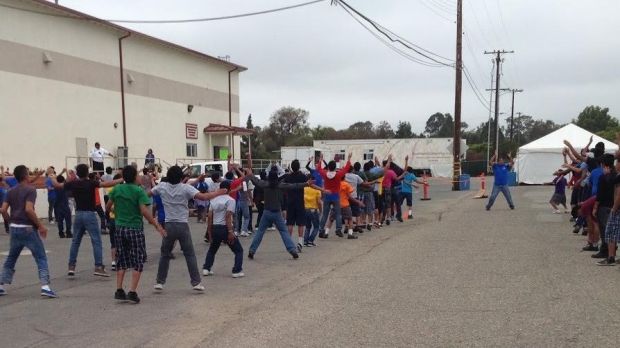
A government site on the western outskirts of Malibu is now a focal point of the U.S. immigration problem that has officials scrambling for a long-term solution to the legislative and humanitarian crisis.
Nearly 500 undocumented immigrants are being temporarily detained in a 42,000-square-foot warehouse at a Naval Base in Port Hueneme, but they make up just a small fraction of the estimated 52,000 who have crossed the border illegally since last fall. Port Hueneme is one of several southwestern locations being used to harbor the flood of immigrants, who are mostly minors or young children and their mothers.
The White House estimates 52,000 people have crossed the Texas border illegally since October 2013.
Bruce Einhorn, a Pepperdine law professor and retired immigration judge, said most migrants are trying to escape third-world conditions and persecution from Central American street gangs wanting to recruit young members.
“These young people are grossly and disproportionately impoverished kids who come from less than solid family lives,” he said. “They are fleeing from gangs that are trying to recruit them into an alternative family life.”
They come mainly from the Central American countries of El Salvador, Guatemala and Honduras — some unaccompanied and some with their mothers. The 18th Street and MS-13 gangs are two of the biggest in Central America, and they also have a presence in the U.S. Recruitment has become a vicious cycle, according to Einhorn.
“Some of the most important gang leaders in Central America are now adults who were teen gang members here [in the U.S.] and were deported. They’re now leading efforts to recruit these teens,” he said.
But with thousands of undocumented minors now detained in the U.S., the U.S.’s highest ranking officials have yet to figure out how to quickly and efficiently process the thousands of cases.
Despite being in the country illegally, experts affirm that the immigrants are entitled to basic human rights across all international borders.
“For someone coming to the United States in hopes of staying with documentation or without … we [the U.S.] still have a minimum amount of standards we have to supply,” said Robert Williams, a human rights expert and political science professor at Pepperdine. “On the other hand, it’s recognized in international law that every state has a right for determining or accepting those that want to come into the country today…The problem for the United States, historically, has been trying to determine who stays and how to grant due process rights for those that are not being allowed to stay.”
The U.S. Department of Health and Human services has been tasked with caring for youngsters waiting in limbo at Port Hueneme and other holding facilities across the Southwest. According to the Los Angeles Times, which sent a reporter on a media tour last month, detainees start their day at 5:45 a.m. and can participate in group activities like ping pong, soccer and art classes. English classes are also offered and detainees have the chance to make two 10-minute phone calls a week to family.
Another holding facility set up in Murietta, Calif. has been the site of protests from both pro- and anti-immigration activists.
Immigration rights activists on Tuesday honed in on Port Hueneme, staging a demonstration advocating for fair treatment of the detainees.
Leaders of the demonstration ranged from the United Methodist Church to the Central American Resource Center. A representative told the Ventura County Star they wanted to “welcome the children and ensure they are taken care of instead of dehumanized.”
The Federal government’s next steps are still unknown, and President Obama on Tuesday asked Congress for $3.7 billion in funding to help process the thousands of undocumented minors currently detained. The money would also be used to beef up border security, hire more immigration judges, conduct aerial surveillance and build new detention facilities. But given the President’s track record with the Republican-led House of Representatives, experts believe an overhaul of the immigration system remains impossible.
Williams said it’s crucial for lawmakers to deal with the crisis expediently.
“The fact of the international rights law says you can’t indefinitely detain someone and basically imprison them if they haven’t committed a crime,” Williams said. “There are certain things you’ve got to do legally, either before you deport them or imprison them.”
Einhorn believes Obama and Attorney General Eric Holder should ask retired judges to go back to work temporarily and handle these cases.
“What would be both efficient and fair is if the government pays for lawyers to come to these centers, vet these kids, represent these kids, try to get them bond and try to get them hearings,” Einhorn said, adding, “and have judges hear these cases on an expedited basis. The more lawyers and judges hearing the cases, the fairer it’ll be.”
